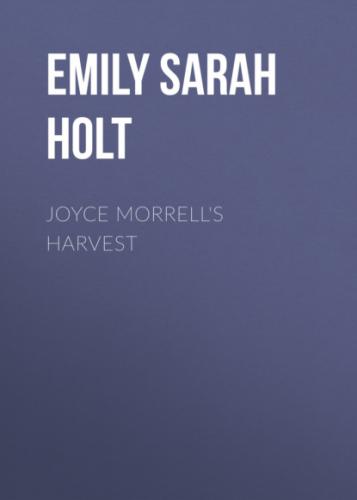Emily Sarah Holt
Joyce Morrell's Harvest
The Annals of Selwick Hall
Published by Good Press, 2019
EAN 4064066176686
Table of Contents
Preface.
Those to whom “Lettice Eden” is an old friend will meet with many acquaintances in these pages. The lesson is partly of the same type—the difference between that which seems, and that which is; between the gold which will stand the fire, and the imitation which the flame will dissolve in a moment; between the true diamond, small though it be, which is worth a fortune, and the glittering paste which is worth little more than nothing.
But here there is a further lesson beyond this. It is one which God takes great pains to teach us, and which we, alas! are very slow to learn. “Tarry thou the Lord’s leisure.” In the dim eyes of frail children of earth, God’s steps are often very slow. We are too apt to forget that they are very sure. But He will not be hurried: He has eternity to work in, “If we ask anything according to His will, He heareth us.” How many of us, who fancied their prayers unheard because they could not see the answer, may find that answer, rich, abundant, eternal, in that Land where they shall know as they are known! Let us wait for God. We shall find some day that it was worth while.
Chapter One.
The Dwellers at Selwick Hall.
“He would be on the mountain’s top, without the toil and travail of the climbing.”—Tupper.
Selwick Hall, Lake Derwentwater, October ye first, Mdlxxix.
It came about, as I have oft noted things to do, after a metely deal of talk, yet right suddenly in the end.
Aunt Joyce, Milly, Edith, and I, were in the long gallery. We had been talking a while touching olden times (whereof Aunt Joyce is a rare hand at telling of stories), and Mother’s chronicle she was wont to keep, and hath shown us, and such like matter. When all at once quoth Edith—
“Why should not we keep a chronicle?”
“Ay, why not?” saith Aunt Joyce, busied with her sewing.
Milly fell a-laughing.
“Dear heart, Edith, and what should we put in a chronicle?” saith she. “ ‘Monday, the cat washed her face. Tuesday, it rained. Wednesday, Nell made a tansy pudding. Thursday, I lost my temper. Friday, I found it again. Saturday, Edith looked in the mirror, and Aunt Joyce made an end of a piece of sewing.’ Good lack, it shall be a rare jolly book!”
“Nay, I would never set down such stuff as that,” answered Edith.
“Why, what else is there?” saith Milly. “We have dwelt hither ever since we were born, saving when we go to visit Aunt Joyce, and one day is the very cut of an other. Saving when Master Stuyvesant came hither, nought never happened in this house since I was born.”
“Would’st love better a life wherein matters should happen, Milly?” saith Aunt Joyce, looking up at her, with a manner of face that I knew. It was a little mirthful, yet sorrowful withal.
“Ay, I would so!” quoth she.
“Child,” Aunt Joyce makes answer, “ ‘happy is the man that hath no history.’ ”
“But things do happen, Milly,” saith Edith. “Thou hast forgot Anstace her wedding.”
“That something happening!” pouts Milly. “Stupid humdrum business! Do but think, to wed a man that dwelleth the next door, which thou hast known all thy life! Why, I would as lief not be wed at all, very nigh.”
“It seemed to suit Anstace,” puts in Edith.
“Aught should do that.”
“Ay,” saith Aunt Joyce, something drily, “ ‘godliness is great riches, if a man be content with that he hath.’ ” (Note 1.)
“Easy enough, trow, when you have plenty,” quoth Milly.
“Nay, it is hardest then,” saith she. “ ‘Much would have more.’ ”
“What wist Aunt Joyce thereabout?” murmurs Milly, so that I could just hear. “She never lacked nought she wanted.”
“Getting oldish, Milly, but not going deaf, thank God,” saith Aunt Joyce, of her dry fashion. “Nay, child, thou art out there. Time was when I desired one thing, far beyond all other things in this world, and did not get it.”
“Never, Aunt?”
“Never, Milly.” And a somewhat pained look came into her face, that is wont to seem so calm.
“What was it, Aunt Joyce, sweet heart?”
“Well, I took it for fine gold, and it turned out to be pinchbeck,” saith she. “There’s a deal of that sort of stuff in this world.”
Methought Milly feared to ask further, and all was still till Edith saith—
“Would you avise us, Aunt Joyce, to keep a chronicle, even though things did not happen?”
“Things will happen, trust me,” she made answer. “Ay, dear maids, methinks it should be profitable for you.”
“Now, Aunt Joyce, I would you had not said that!”
“Why,
